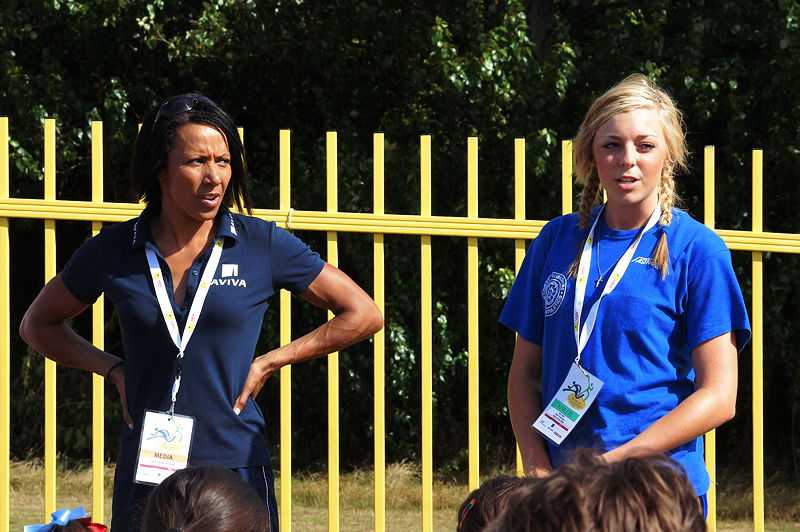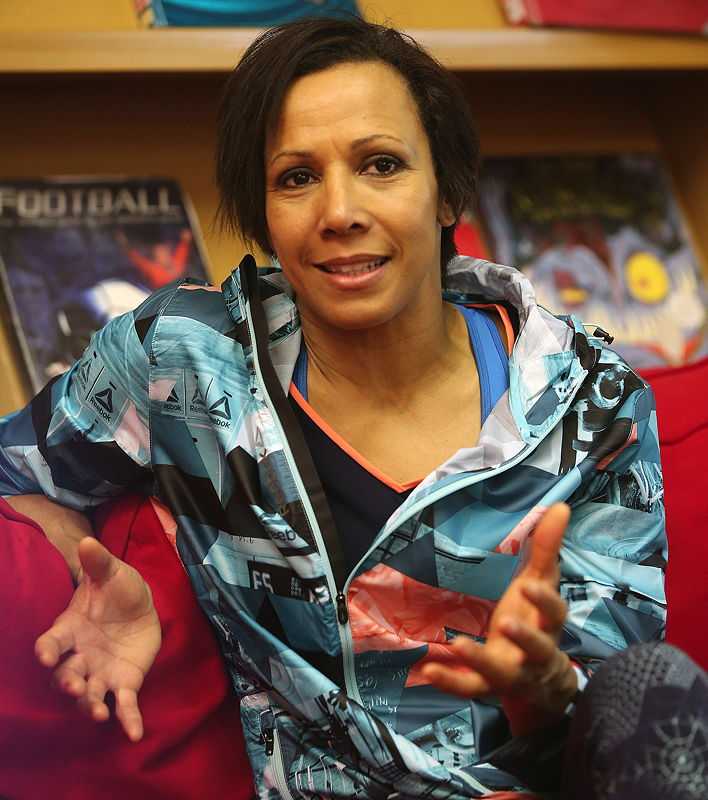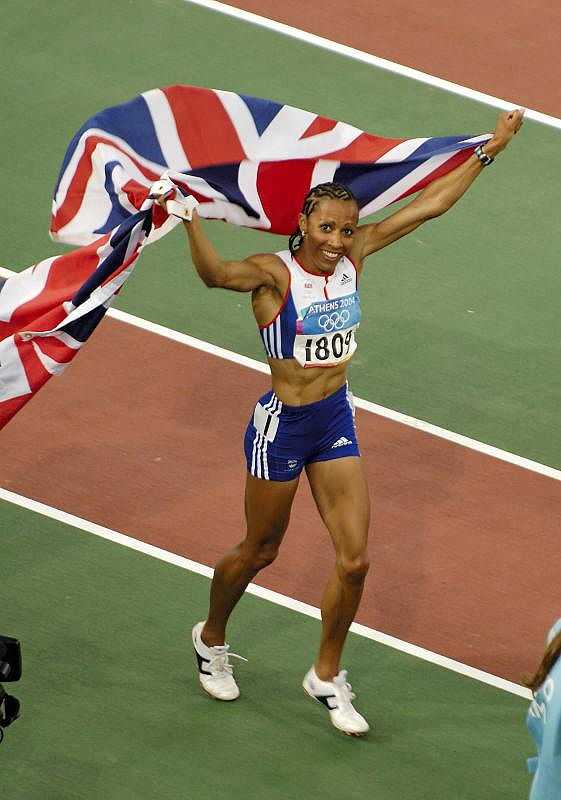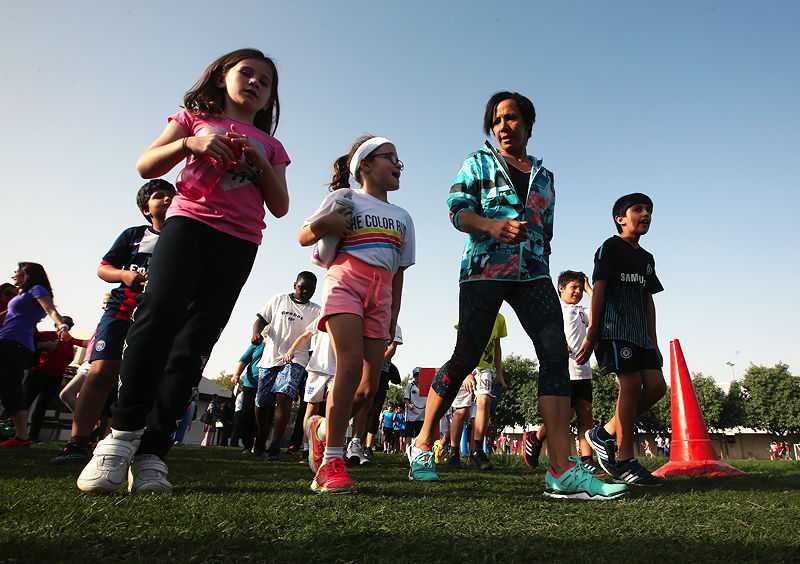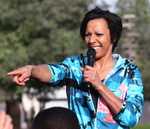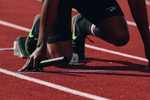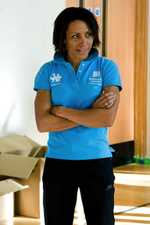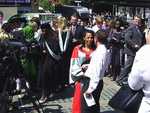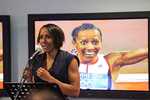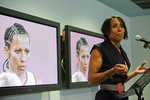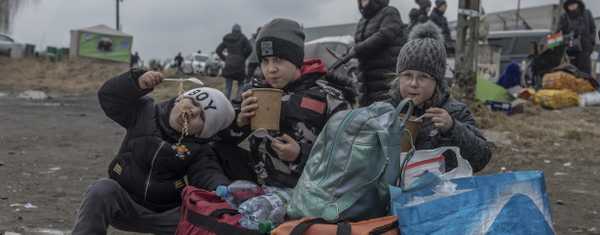1. Holmes' Early Life
Kelly Holmes was born 19th April 1970 in Pembury in Kent. She was raised by her mother Pam, her father having left before she was one year old.
Her mother was just 17 when she had Kelly and, amid doubts she would be able to cope, the young Kelly spent time in a couple of homes as adoption was considered. However her mother was determined to keep Kelly and when she was four years old her mother married Mick Holmes who Kelly has always viewed as her real father.
It was a happy childhood, with Holmes attending the Hugh Christie comprehensive school in Tonbridge, though she was not particularly academically inclined. However she was an exceptionally talented young athlete, joining Tonbridge Athletics Club when age 12, where she was coached by David Arnold.
In 1983 Holmes gave a glimpse of her middle distance talent when she won the English Schools 1500m title. However without funding she was not able to pursue athletics full time when she left school at age 16, working in a shop and as a nursing assistant before joining the army at 18 years of age.
Initially Holmes was a truck driver in the army before becoming a physical training instructor and achieving the rank of Sergeant. While in the army Holmes continued to run and would have to compete in the men’s 1500m to find suitable competition. Not just content with winning lots of running races Holmes also became the British Army judo champion.
2. Early Career
Watching the 1992 Olympics inspired Kelly Holmes to train seriously once more and for the next five years she would combine athletics with her army career.
Her impact was instant, winning the national titles for both middle distances and qualifying to run the 800mat the 1993 World Championships.
The following year saw Holmes win her first major title when she took gold in the 1500m at the 1994 Commonwealth Games in Canada, having previously taken silver over the same distance at the European Championships.
In 1995 Holmes took home a silver and bronze from the World Championships in Gothenburg in Sweden. In a year of progress she also broke the British records for the 800m and 1000m, placing her in good stead for the Atlanta Olympics in 1996 in the US. However, in a development which would become an all too familiar feature of her career Holmes suffered an injury in the run up to the games.
A stress fracture saw her requiring cortisone injections to compete and although she battled through to the final of the 1500m, Holmes agonisingly missed out on a medal when finishing fourth. Yet all this had been achieved so far while Holmes was combining her athletics career with her army career. In 1997 she made the decision to completely focus on running, leaving the army to train full time.
That same year she became the British record holder over 1500m and headed to the Athens World Championships as one of the favourites for gold. Unfortunately injury struck again as she ruptured an Achilles tendon in the heats, quickly ending any hopes Kelly Holmes or the watching British athletics fans had that she would win her first global title.
3. The Long Road to Olympic Gold
The next four or five years were going to prove tough for Holmes as injury and illness kept blighting her ambitions.
Stomach surgery, glandular fever and a ruptured calf muscle were just some of the issues Holmes had to face as she struggled on with her athletics career.
However amid all this disruption Kelly Holmes was still able to win silver at the 1998 Commonwealth Games over 800m, before claiming gold four years later at the same distance at the home games in Manchester. Holmes was concentrating on the 800m event as the constant injuries meant she was not able to do the stamina training necessary to compete over the longer 1500m distance.
Kelly Holmes showed a brilliant return to form at the 2000 Olympics in Sydney, Australia, where she won a bronze medal, but the following year she was sixth at the World Championships having undergone stomach surgery.
In 2002 she decided to change coach, leaving Dave Arnold after 18 years and teaming up with Margo Jennings. Holmes also started to train in South Africa alongside her friend Maria Mutola, a world-class athlete in her own right.
It seemed to pay off as in the build up to the Athens Olympics Holmes set three new personal bests as well as winning a silver in the 800m at the 2003 World Championships, despite suffering with injury issues again prior to the tournament.
Athens 2004 was to be Kelly Holmes’ defining moment in athletics. After all the heartache and disappointment leading up to major tournaments in previous years her body held firm and she was able to finally display the talent she possessed to the full. Her friend Mutola was favourite for the 800m, but Holmes held on for the win and in doing so set the scene for the iconic photo of her moment of realisation she had won.
Just five days later Holmes repeated the glory by taking the 1500m gold too, only the third woman to achieve the Olympic middle distance double. Holmes had run two personal bests to secure the historic double, including a new British 1500m record. She was also the first British athlete since Albert Hill in 1920 to achieve the Olympic middle distance double.
4. Retirement and Legacy
With her childhood Olympic dreams fulfilled and on the back of recurring achilles issues, Kelly Holmes retired from the track in 2005.
The same year she retired she was named Laureus Sportswoman of the Year, having been crowned BBC Sports Personality of the Year (Viriginia Wade etc.) in 2004 following her double gold success. She also became Dame Kelly Holmes in 2005, having previously been awarded the MBE in 1998.
In 2008 Kelly Holmes set up a charity called the Dame Kelly Holmes Trust which looks to use athletics as a way to help disadvantaged young people with education, training and employment opportunities.
Holmes also ran the Camp for Kelly initiative for ten years which looked to mentor young athletes, helping them develop their careers through education and learning from her own and other retired athletes experience within the sport. Holmes is also a much sought after motivational speaker whose own life story and experience in overcoming difficulties to achieve goals can inspire listening audiences.
Indeed, Kelly Holmes has been very open about her own mental health struggles as a world class athlete trying to cope with the lows of injury and the expectations of success. She has talked about how she would cut herself and cover the marks up with make-up and believes it is important to talk about this in order to try and help others. Since the end of her track career she suffered with depression again following the death of her mother in 2017.
Holmes had an incredible year in 2004, a fitting end to an athletics career which mixed talent with pure determination. That Olympics year was the first one in seven where she had not suffered an injury and went in to the games in the shape of her life.
Her performance inspired young people across the country to run and her Camp for Kelly allowed some of them to train and learn from their idol. She became a full-time athlete at a comparatively late age when she left the army and the extra strains on the body took their toll. Yet the message she continues to convey is that if she can get through all those lows then other people may get through theirs too.
Kelly Holmes alongside other sportsmen like Ian Botham has been very influentual with her charity work.
